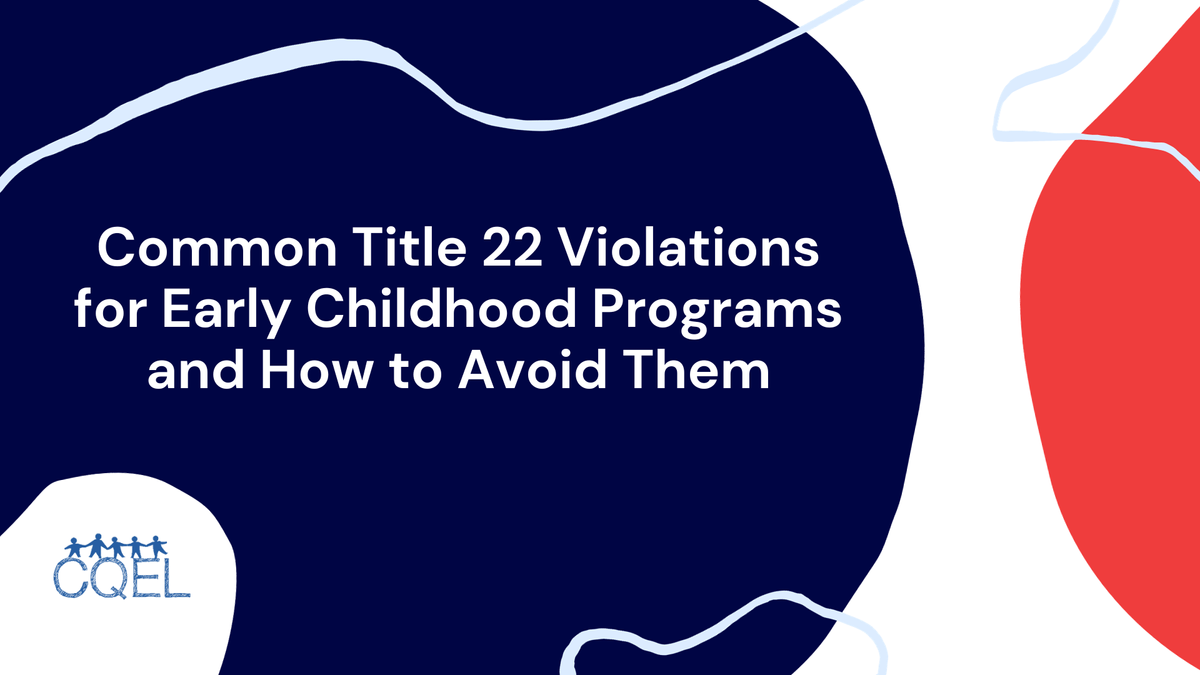Common Title 22 Violations for Early Childhood Programs and How to Avoid Them
Title 22 compliance can be complex and challenging, but it is essential for all early childhood programs. By complying with Title 22 requirements, programs can help to ensure that children are safe and healthy and that they are receiving a high-quality early childhood education.

Early childhood education is essential for the development and well-being of children. It provides them with the opportunity to learn and grow in a safe and nurturing environment. However, early childhood programs must comply with a number of regulations, including Title 22 of the California Code of Regulations. Title 22 is designed to protect the health, safety, and well-being of children in care.
Title 22 compliance can be complex and challenging, but it is essential for all early childhood programs. By complying with Title 22 requirements, programs can help to ensure that children are safe and healthy and that they are receiving a high-quality early childhood education.
Why Title 22 Compliance is Important
Title 22 compliance is essential for ensuring the safety and well-being of children in early childhood programs. When programs fail to comply with Title 22 requirements, children are at risk of injury, illness, and abuse.
Common Title 22 Violations
The most common Title 22 violations for early childhood programs in California include:
- Improper supervision: Children must be supervised by qualified staff at all times. This means that staff must be within sight and hearing of children at all times.
- Unsafe environment: The physical environment must be safe and free of hazards. This includes having safe and appropriate play equipment, as well as having a clean and sanitary environment.
- Inadequate staffing: Programs must have enough staff to meet the needs of the children in care. This means having the appropriate staff-to-child ratio.
- Failure to follow procedures: Programs must have and follow written procedures for all aspects of their operation. This includes procedures for things like diapering, feeding, and emergency response.
- Lack of training: Staff must be trained on Title 22 requirements and on best practices for early childhood education.
Legal and Financial Consequences of Title 22 Violations
Early childhood programs that violate Title 22 requirements may face serious legal and financial consequences. These consequences may include:
- Fines: The California Department of Social Services (CDSS) can impose fines on programs that violate Title 22 requirements.
- Suspension or revocation of license: The CDSS can also suspend or revoke the license of a program that violates Title 22 requirements. This can put the program out of business and leave children without a safe and nurturing place to learn and grow.
- Lawsuits: Parents of children who are harmed as a result of a Title 22 violation may sue the program for negligence.
How to Avoid Title 22 Violations
There are a number of things that early childhood programs can do to avoid Title 22 violations. Some of these things include:
- Familiarize yourself with Title 22 requirements. The CDSS website has a number of resources available to help programs understand Title 22 requirements.
- Develop and implement written policies and procedures. These policies and procedures should be based on Title 22 requirements and on best practices for early childhood education.
- Provide training to all staff on Title 22 requirements and on best practices for early childhood education. This training should be provided on an ongoing basis.
- Conduct regular self-assessments to identify any areas where your program may be out of compliance with Title 22 requirements.
- Correct any deficiencies that are identified during self-assessments or during licensing inspections.
By following these tips, early childhood programs can minimize their risk of Title 22 violations. By complying with Title 22 requirements, programs can help to ensure the safety and well-being of the children in their care.
Additional Tips
- Join a professional organization for early childhood providers. These organizations can provide you with support and resources to help you comply with Title 22 requirements.
- Network with other early childhood providers. Share best practices and learn from each other's experiences.
- Be proactive. If you have any questions or concerns about Title 22 compliance, contact the CDSS for assistance.
